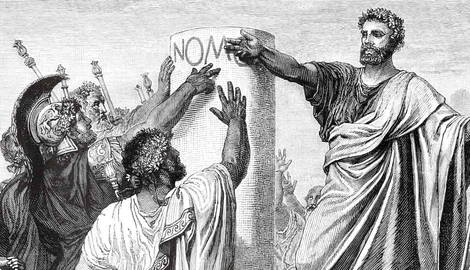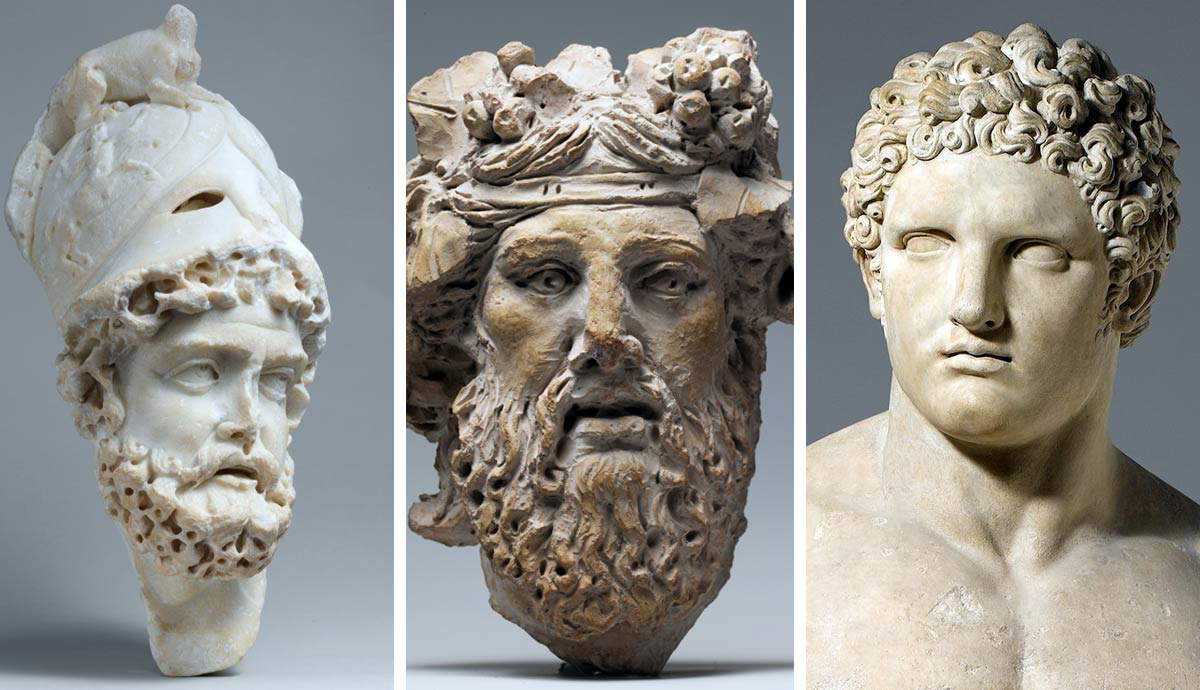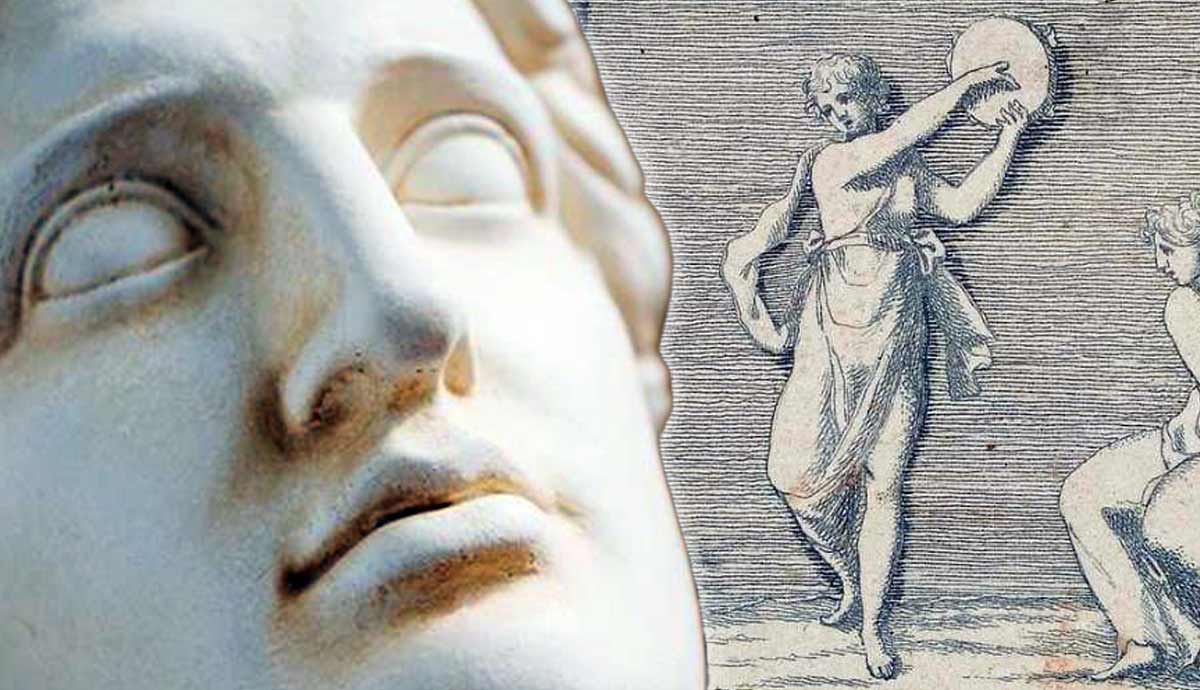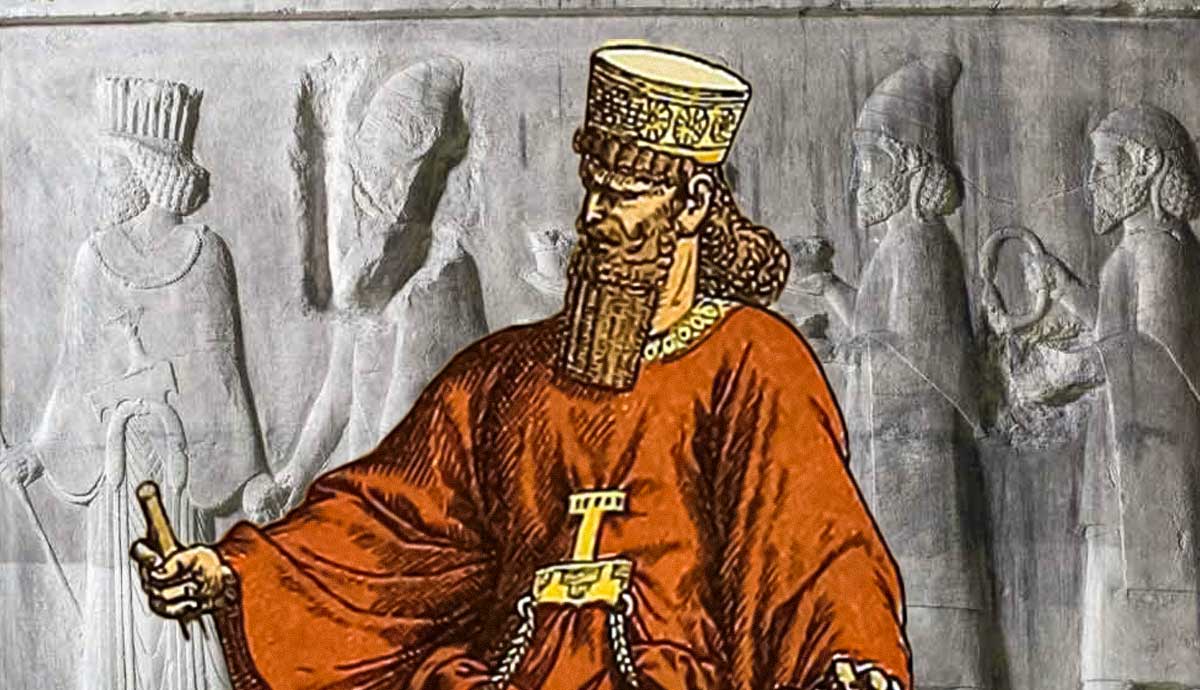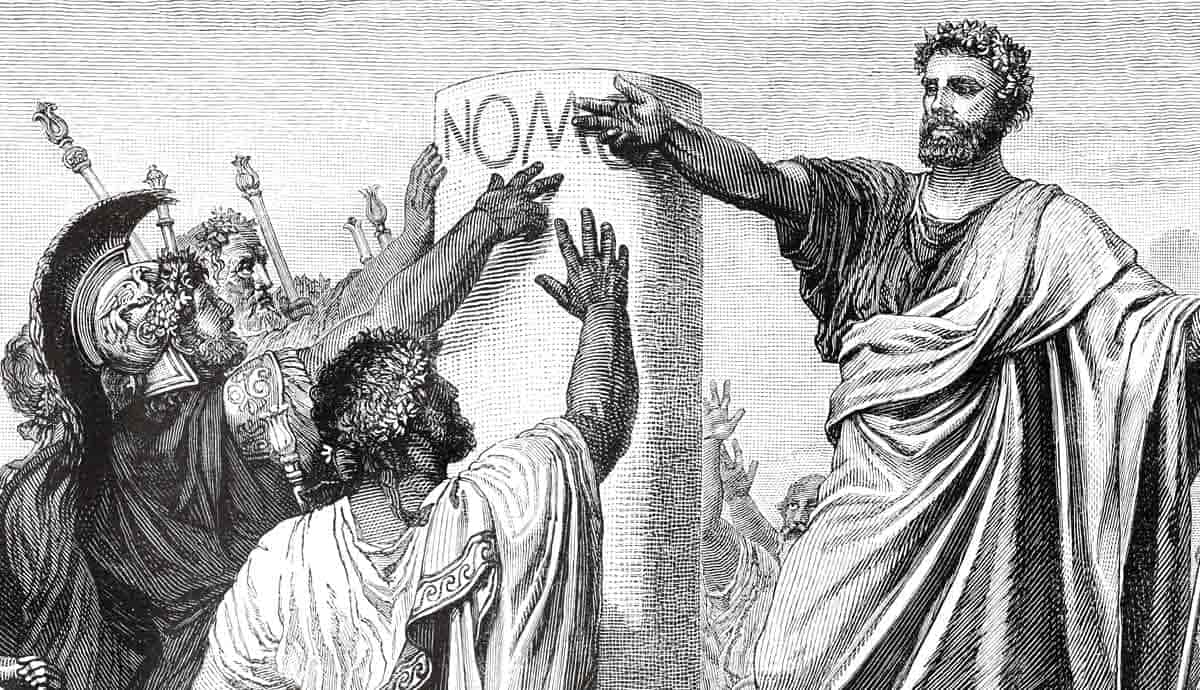
Solon was considered by Plutarch and many other ancient authors as one of the seven wise men, or sages, of Greece. He became famous as a statesman but was also a philosopher and poet. He came to power in Athens in the early 6th century BCE when the city was in political and economic turmoil. Though many of his supporters told him he should claim sole rule over Athens, Solon always held to his convictions that rule by tyrants brought only turmoil.
Early Life of a Statesman

Recounted in Plutarch’s Parallel Lives, Solon was born on the island of Salamis into a noble family and was related to the tyrant Peisistratus. His father spent much of the family’s wealth on various charities, so as a young man, Solon worked as a merchant, though some say he traveled more to gain experience than for money. He became quite rich and lived a life of luxury, even though he still didn’t consider himself wealthy. He spent his time learning from the best teachers and with other wise men of the age, leading to his reputation as one of the seven sages of Greece. He wrote poetry in his spare time, but as he aged, he began to use his poetry to express his philosophical and political views.
Rise to Power

At the time, Athens had been in conflict with Megara over Salamis, the island where a century later the Greeks would claim a decisive victory over the invading Persians. For many years Athens suffered several defeats at the hands of the Megarians, culminating in them passing a law punishing any man with death if they suggested a renewal of the war. Yet despite this law, there was still an appetite for war. Solon pretended to be out of his mind and went into the market where he recited a poem inciting the citizens to renew the war for Salamis. The law was repealed and Solon was put in command of the war effort.
Solon devised a clever strategy to defeat the Megarians. Having sailed to Cape Colias, Solon saw all the women of the city performing a sacrifice to Demeter. He had one of his soldiers sail to Salamis pretending to be a deserter and had the man tell the Megarians that they had an opportunity to capture the women of Athens if they went to Colias. When Solon saw their ships sailing back from the island, he told the women to withdraw and had the younger, beardless soldiers dress in the woman’s clothes and dance on the shore until the Megarians had disembarked. The enemy soldiers were lured in and slaughtered. Solon then led the Athenians to Salamis and took possession of the island.
A different account of Solon’s victory recounted that he landed on the island at night, then took 500 volunteers to wait on fishing boats off the coast. The Megarians heard of the Athenian’s landing and so set out to meet them, sending a ship to scout out their location. Solon captured this ship and manned it with his own soldiers, then sent the ship to capture the city. The Athenian army engaged the Megarian army, while the captured spy ship seized the city unopposed.
Political and Economic Reforms

Solon’s victory over Megara made him famous and well-respected. With the war now over, Athens was engulfed in internal political strife. There were many factions that all vied for power, and all wanted a different form of government. Some wanted extreme democracy, while others wanted an oligarchy. Others still wanted a mixed system and ensured that no side gained too much power.
There was extreme economic disparity. Common people became increasingly indebted to the rich and were forced to become serfs or even to sell themselves, or their children, into slavery. They thought the only way out of this was to install a tyrant, one man with absolute control over the levers of government, to save the city. To that effect, Solon was named Archon. The nobility approved of him because of his lineage and the common people because of his honesty. He was even urged by his friend to become a tyrant and seize control of the city, but he refused.
One of his first acts was to cancel all debts. When he told some of his friends that he was considering this action, they immediately took advantage by borrowing large sums of money and buying up estates. This made it seem like Solon was not subject to his own laws and instead benefited from them. However, it was soon discovered that Solon himself had lent either five or fifteen talents, a talent being a unit of currency equaling roughly nine years of pay, and he was first to forgive these debts. At first, no one seemed happy with this new law. The rich were upset that they lost sizable income, while the poor were upset that Solon didn’t redistribute land as they had expected he would.

He was next given powers to reform the shape of the government. He immediately repealed all the laws of Draco except for the homicide laws because they were too severe and used the death penalty as a punishment regardless of the crime. Solon then opened government positions based on wealth rather than birth. Those who were too poor to be in magistracies were allowed to be members of the assembly and jurors. This gave the poorer population a lot of power, since most disputes could be appealed and decided by jurors.
Given the civil strife that preceded Solon’s reforms, he created a law that encouraged an active citizenry and disenfranchised those who did not participate. This law has usually been interpreted to mean that those who did not take a side in a civil conflict, preferring to remain neutral, would be disenfranchised. But some scholars believe this to be a mistranslation and that the law actually encouraged active neutrality. Citizens were encouraged to actively put themselves in the middle of the conflict without picking a side in order to prevent escalation. Whatever the true meaning of the law, its essence was to encourage participation in political life.
He also changed the monetary system and enacted several laws pertaining to family life. All of his laws were to be in place for a hundred years. As soon as the laws were put in place, people would come up to Solon to either praise or chide him, and ask him to add or remove clauses. It was because of this that Solon decided to leave Athens for ten years so that the people could become accustomed to his laws.
Self-Imposed Exile

After Solon had enacted his laws and the Athenians swore to live by them, he left the country to ensure that the laws could not be repealed since only he was able to repeal them. He first went to Egypt, where he conversed with priests about ancient history. Solon told them about the genealogy of men and the story of Pyrrah and Deucalion surviving the Flood. The Egyptians then told him about Atlantis and how it sank beneath the sea. This myth was never before heard in Greece, and Solon was responsible for bringing it to the mainland.
Solon then went to Cyprus, to a small city ruled by King Philocyprus called Aipeia. The city was located in a strategic location, but not comfortable to live in. Solon persuaded the king to move the city into the plains where there was more space. He also stayed to help arrange and administer the city, the result being that many people flocked to it. Philocyrus honored Solon by renaming the city Soli after him.

Solon was then summoned to Sardis by King Croesus, who knew of his reputation as a wise man. After showing Solon the vast riches he had accumulated, Croesus asked Solon who he believed was the happiest man he knew. Solon answered that it was Tellus, a man from Athens. He had virtuous children, and his children had children of their own. He died in battle defending his city and was buried with honors at public expense.
Croesus then asked who he thought the second happiest man was, and Solon replied that it was two brothers, Biton and Cleobis. During a festival for Hera in Argos, their mother needed to be conveyed to the temple by a team of oxen, but their oxen hadn’t come back from the fields in time, so the two brothers yoked themselves to the wagon and pulled it up to the temple themselves. They were praised by the citizens and celebrated with a feast. They then went to sleep and never awoke again. The people of Argos dedicated statues of them in Delphi.
Croesus was annoyed that the sage did not consider him the happiest, given his vast wealth and power, and he chided him for it. Solon replied that every day in a man’s life can bring either fortune or misfortune, so you can’t know if a man is truly happy until you know how their life ended. Until that point, the best that can be said of them is that they are lucky. Croesus didn’t like Solon’s answer and asked him to leave.
Return to Athens

When Solon returned to Athens the city was again in turmoil. One faction was led by Lycurgus, another by Megacles, and last by Peisistratus. Solon tried to mediate between the parties, but none were genuinely willing to listen to him. Peisistratus played the populist, but Solon knew that he simply wanted to install himself as a tyrant. Solon opposed Peisistratus’ attempts to win over the people and gain power, but he was ultimately unsuccessful.
Even when Peisistratus became a tyrant, Solon did not stop speaking out against him. He wrote poetry chiding the Athenians for allowing themselves to be ruled by a strongman and encouraging them not to abandon their liberty. Many thought that Solon would be put to death for his opposition, but Peisistratus instead offered Solon a position as a counselor.
Despite his efforts to protect Athens from civil conflict, Solon was unable to end the desperate power struggle that plagued the city throughout the 6th century. Peisistratus retained most of Solon’s laws, and Solon approved of many of the new laws Peisistratus enacted. By this point, Solon was an old man. He passed away just two years into Peisistratus’ rule.
